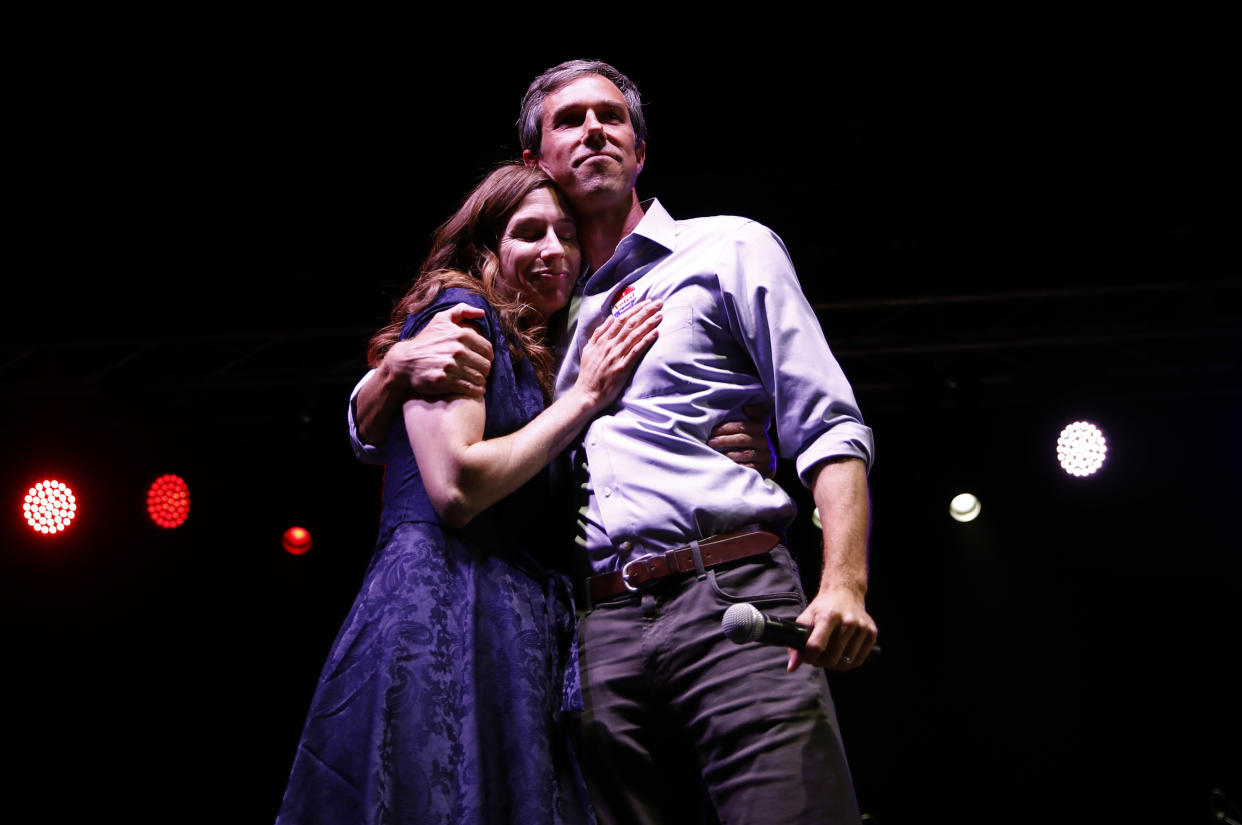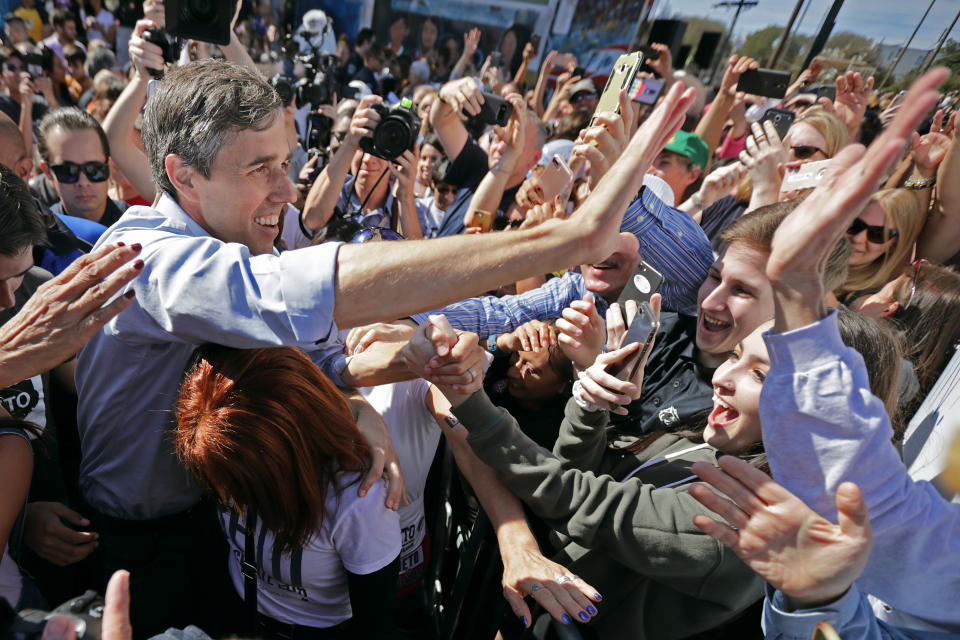Where does Beto go from here? Hint: He’s not running in 2020.

EL PASO, Texas — Beto O’Rourke marked the end of his unlikely and ultimately unsuccessful bid to unseat Ted Cruz in Texas’s surprisingly competitive Senate race just as he began it some 20 months ago — by clicking on his Facebook Live stream and walking through the crowd of thousands of adoring supporters gathered here as a few hundred thousand others watched online.
But long before he reached steps of the giant stage erected in the minor league ballpark here at the edge of downtown El Paso, where his campaign had held his election night watch party and where he would formally concede the race to Cruz, the handwringing and criticism over his failed candidacy had already begun.
In a hotel ballroom hundreds of miles away in Houston, where Cruz and his supporters had sweated out the final hours of the election wondering if the junior senator would survive, the senator’s father, Rafael, jumped on stage ahead of his son to lead chants mocking O’Rourke and accusing him of trying to “buy” an election with the help of Democratic bogeymen George Soros and Chuck Schumer. “Texas remains free!” he declared.
On Twitter, commentators and reporters, many of whom had never stepped foot in Texas to cover the race, posted instant takes criticizing the media for covering a candidate they argued never had a chance in a red state where Republicans rule. The Atlantic quoted an anonymous Democratic strategist suggesting O’Rourke had blown it by being “a cause, not a candidate,” and suggested his celebrity had worked against him in the race. And Politico re-upped its piece from two days earlier predicting that O’Rourke would lose because he should have run as a centrist.
But all the chatter ignored a crucial point about O’Rourke’s loss Tuesday night. While national Democrats had long predicted their quest to regain majority control of the U.S. Senate rested on the outcome of races in states like Tennessee, North Dakota and Missouri, where the party’s candidates charted a centrist path in hopes of wooing voters deep in Trump’s America, O’Rourke came closer to winning than any of those candidates. With more than 99 percent of the votes counted, Cruz was leading O’Rourke by just 2.6 percent — a shockingly close result in a state where a Democrat has not won statewide office since 1994. The last time a Senate race in Texas was decided by single digits was 1978 — 40 years ago.

Going into Election Day, Cruz’s political firewall had been deep red rural Texas, where the bulk of the state’s Republican voters live, and election results suggested voters there helped put him over the top. But O’Rourke’s unorthodox strategy of taking his campaign to all of the state’s 254 counties in hopes of expanding the map didn’t necessarily fail. While he never expected to win rural Texas, he had hoped to activate “non-voters” in those regions and add to his expected victories in the state’s big cities, like Austin, Dallas and Houston. Election results suggest he did post modest vote gains compared to previous Democratic Senate candidates and Hillary Clinton’s performance in 2016, including in areas like Amarillo and Wichita Falls. It just wasn’t enough.
At the same time, O’Rourke accomplished something Democrats had been trying to do for years: He flipped Tarrant County, besting Cruz by the narrowest of margins: 49.7 percent to Cruz’s 49.3 percent. The area, home to Fort Worth, had been the last deeply red urban county in America. Now it’s purple, suggesting it could be part of an expanding Democratic map in north Texas. Dallas County went bright blue on Tuesday as O’Rourke’s coattails likely helped Democrat Colin Allred defeat incumbent GOP Rep. Pete Sessions in one of the biggest congressional upsets of the night.
But what does it all mean — for Texas and for O’Rourke? Many state Democrats had been wary of O’Rourke’s go-it-alone strategy of focusing on rural Texas and espousing deeply progressive views in a state that is so resoundingly conservative. But last night, their feelings wavered between despair — wondering how, if O’Rourke with all of his money and charisma couldn’t win in Texas, any Democrat could — and hope, as the results came in closer than anyone had expected. But they credited O’Rourke’s position at the top of the ticket with helping the party win two U.S. House races —including Allred’s in the 32nd District and the Seventh District race in Houston — and more than a dozen seats in the state Legislature. While Republicans held their statewide posts — including Gov. Greg Abbott, who is considered a possible future presidential candidate — their victories were the weakest in years, suggesting Democrats could be viable in the state in 2020.
What is unclear is whether Democrats can maintain that enthusiasm or whether O’Rourke was a one-off candidate who ran at the right time. The three-term El Paso congressman clearly struck a chord with his relentlessly hopeful message and undeniable star power that attracted rock star-sized crowds on par with Donald Trump’s, and record-breaking campaign contributions. But he also happened to be running against Cruz, a candidate widely disliked even by members of his own party.

It’s an unknown that also weighs heavily on what O’Rourke does next. In a post-2016 political environment in which no single figure has emerged to capture the hearts and imaginations of Democrats eager to see their party rise out of the Trumpian wilderness, O’Rourke was many months ago branded the party’s most promising rising star.
And as the campaign wound its way toward its end, the drumbeat of the looming 2020 election began to pulse incessantly everywhere O’Rourke went, led by supporters both in and outside of Texas who saw him as a transformational figure with the campaign skills, political savvy and fundraising ability to lead Democrats back into the White House.
But at every step of the way, O’Rourke has shut down the talk, including on Monday when he once again ruled out a presidential bid in two years. “I will not be a presidential candidate in 2020,” he told reporters in Houston. “That is as definitive as it gets.”
Candidates have been known to backtrack before. But those close to O’Rourke say his denials are sincere. The congressman spent the better part of the last two years away from his wife, Amy, and their three kids as he traveled the dusty backroads of Texas. A friend said the separation had weighed heavily on O’Rourke, particularly in the final weeks, and that he genuinely had no appetite or deep ambition to embark on a campaign that would take him away from his family for another two years.
In an emotional moment on his livestream last week, as he raced around the state in search of the last few votes, O’Rourke spoke of how much he missed his wife. He said he was dreaming of the moment where he could just sit down with a cup of coffee with her in their backyard and not have to be anywhere. “I just want to have a moment and reconnect and be,” he said.

But the eyes of Texas, and beyond, are on the proud son of El Paso. On stage Tuesday night in El Paso, where he said he had spoken to Cruz, congratulated him and offered his help in bringing Texans together, O’Rourke said he still remained hopeful about the future.
“I’m as inspired, I’m as hopeful as I’ve ever been in my life, and tonight’s loss does nothing to diminish the way I feel about Texas or this country,” O’Rourke said. He pointed to Democratic gains up and down the ticket, praising his small campaign staff and thousands of supporters here and beyond who had come together to make history, even as he came up short. “I am so f***ing proud of you,” he declared.
And with that, O’Rourke bid farewell, but hinted it wouldn’t be forever. “We’ll see you out there down the road,” he said.
_____
Read more from Yahoo News:
The CIA’s communications suffered a catastrophic compromise. It started in Iran.
Ending the Qatar blockade might be the price Saudi Arabia pays for Khashoggi’s murder
How Robert Mercer’s hedge fund profits from Trump’s hard-line immigration stance
Trump’s target audience for migrant caravan scare tactics: Women
Photos: Worldwide Google walkout over sexual harassment, racism and pay inequality



